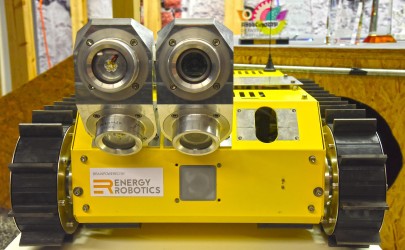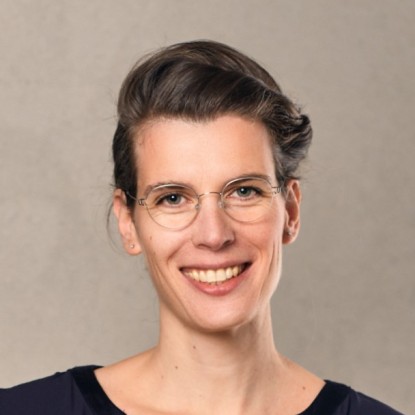Autonomous overseers
TU graduates and TU robotics experts found „Energy Robotics“
06.03.2020 von Astrid Ludwig
Four graduates and the computer science professor and robotics expert Oskar von Stryk have founded the company “Energy Robotics”. Their software for autonomous inspection robots has made the team a global leader in the market for monitoring oil, gas and chemical plants. An example of the successful transfer of ideas and knowledge at Technical University (TU) of Darmstadt.

Dr Alberto Romay opens the website with a swift click. The screen immediately displays several video panels showing camera movements through industrial plants. These are real-time images taken by inspection robots on their inspection rounds. They rumble unerringly over paved paths, narrow metal grates and through winding corridors – even steps are no problem. The surveillance vehicles, which look like sturdy high-tech vacuum cleaners with tracks, move autonomously. Their camera-controlled inspection route follows coloured lines and squares on the ground, which indicate the direction and the control points. The computer scientist explains that the square fields, which resemble QR codes, contain instructions on which instrument or display to check at this point, which pipe to look at or which gas or air measurement to take. The results of the inspection rounds are documented in detail with maps, photos and measurement graphics.
The plants that can be seen on the laptop in the laboratory of the Department of Computer Science belong to interested companies from the oil, gas and chemical industries, for which the TU founders have installed test tracks for the autonomous inspection robot. “We are currently in the test phase with around a dozen pilot customers on four continents”, reports computer science professor Oskar von Stryk. Among others for Shell in Rotterdam. The inspection rounds are monitored and controlled from the customers' respective locations. The advantage: Customers do not need their own equipment. “All you have to do to access the results of the control rounds is log into the website we provide”, explains Dr Alberto Romay. The robots are controlled via the public mobile phone network, and access is protected through special security systems and encryptions, emphasize the computer scientists. “Our software and technology can be used immediately”, says Dr Stefan Kohlbrecher.
Energy Robotics GmbH is ready for take-off
In March 2019, the former doctoral students Alberto Romay, Stefan Kohlbrecher, Dorian Scholz and the TU alumnus Marc Dassler founded the company “Energy Robotics GmbH” together with Oskar von Stryk. They offer a complete software solution, from autonomous and assisted control of mobile ground robot systems, their remote programming and monitoring to the processing and transfer of data to the customers' cloud systems. The hardware for this is built by their partner company “Ex-Robotics B.V.”. The company from the Netherlands is one of the few in the world to build explosion protected robots whose electronics are specially encased so that they do not ignite gases in a sensitive and explosive industrial plant environment, the track drive does not produce sparks and sensors do not generate dangerous heat. The partners found each other “because we were on the market very early with our software”, enthuses Dorian Scholz.
The father of the rescue robot team Hector
The members of the TU founding team have known each other for more than ten years. “We all have our roots in our university’s robot soccer team”, says Dr Stefan Kohlbrecher. He and Dorian Scholz were initially undergraduate students and later doctoral students of Professor von Stryk. They were joined by the Mexican Alberto Romay when international university teams came together at the RoboCup, the Robot Football World Championship in Graz 2009, and the TU Darmstadt dominated the scene with its robot footballers. “I thought then, that's where you have to go”, Romay remembers. In 2012 he moved from Mexico City to Darmstadt with a doctoral scholarship.
Dr Stefan Kohlbrecher is the “father” of the rescue robot team Hector – an autonomous emergency helper and a development that has yielded many other projects. These include participation in 2014 in the ARGOS Challenge of the French oil company Total, which involved the use of autonomous robots on gas and oil platforms. At the time, five out of 31 international applicant teams were selected to compete with their prototypes over a total of three years, with competition rounds and missions lasting several weeks. They had to show how their software and hardware could master inspection rounds, emergency situations and rescue operations. The French team was the favourite, “but in the last round we won by a large margin”, emphasises Professor von Stryk. “At that point it became clear to us: There is a market for our technology.” The idea of the spin-off was born.
"Our technology serves to protect the environment. We help to detect and prevent gas leaks or accidents at an early stage. The use of robots protects employees who do not have to enter the danger zone themselves", emphasizes co-founder Stefan Kohlbrecher.
The market in the oil and gas segment is large. There are more than 9,000 offshore plants and over 100,000 onshore plants worldwide. Many are not manned, but inspections are always necessary. “We are the first commercial providers for this”, explains Dorian Scholz. “Our technology serves to protect the environment. We help to detect and prevent gas leaks or accidents at an early stage. The use of robots protects employees who do not have to enter the danger zone themselves”, emphasizes co-founder Stefan Kohlbrecher.
In 2018, Energy Robotics received an EXIST Research Transfer grant from the German Federal Ministry for Economic Affairs and Energy, which was extended until July of this year. This currently provides funding for three full-time founders in the team to drive the development forward. An application for a further one-off grant is currently underway. The team praises the support provided by HIGHEST, the innovation and start-up centre of the TU. Licensing negotiations with the university's IP management, which helps TU scientists to protect their inventions, apply for patents and also to exploit their ideas, were also successful. Furthermore, the founders can also rely on the experience of TU alumnus Marc Dassler, who has already founded several IT companies.
“We are currently looking for investors”, reports Dorian Scholz. The founding team is actively searching, “but some of them also contact us because they came across our website.” The interest in the industry is tremendous, he says. Energy Robotics expects to write in the black within a short time. In the long term, the TU founders want to make their currently still expensive technology so affordable that volunteer fire brigades or the German Federal Agency for Technical Relief can also afford it for their rescue missions.



